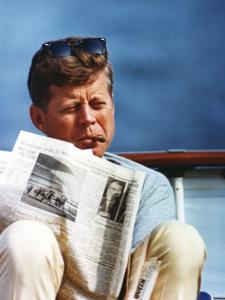Virtual JFK, Actual Johnson
Review

The new film “Virtual JFK” is marketed as the story of the Vietnam War had John F. Kennedy not been killed. I expected a fantasy account of what might have been, and this led me to expect the following problem with the story: If Kennedy was killed because he would not fight a war in Vietnam, then supposing him to have survived Dallas would simply have left him in danger of assassination at each ongoing instant in the drama. We would have had to constantly fantasize Kennedy back to life through the course of such a movie.
But “Virtual JFK” actually consists of a review of the evidence from Kennedy’s actions before he died and of the situation that confronted Lyndon Johnson as president, thereby making the case that had Kennedy lived we would not have seen a full-scale war in Vietnam. The film argues that in six instances Kennedy faced intense pressure to launch wars, and that in each instance he refused. The six were: the Bay of Pigs, Laos, Berlin, Vietnam, Cuba again, and Berlin again. Kennedy’s top advisors, representatives of the permanent government, spokesmen for the military industrial complex then closer to its infancy, all urged him in the strongest terms at these moments to fight. They told him he had no other choice.
Yet Kennedy made a different choice. And as he did so, he remained popular with the public, if not with his own subordinates. In contrast, when Johnson opted to obey the war mongers, his popularity plummeted so hard that he was unable to run for election to another term. Kennedy is remembered as our hippest, coolest, most macho president, perhaps in part because of his looks, because he was killed, or because — like Clinton — he had a lot of sex. But he also struck one as having nerve and courage when he spoke, and it may be that he did, and it may be that he used those qualities to stand up to the war machine as much as to ride in its front seat (we know that he did plenty of that as well).
Former CIA analyst Ray McGovern warned this week that President Barack Obama fears the CIA. Obama is in some ways a “virtual JFK.” His brand is built on his looks, his speech, his youth, his cry for change and a bright future. But Obama’s behavior in relation to the CIA and the war machine parallels Johnson’s, not Kennedy’s. Obama has granted these people immunity for crimes, agreed to cement in place criminal policies of rendition and preventive detention, and to maintain the power to torture while choosing not to use it. He has maintained the war in Iraq while escalating those in Afghanistan and Pakistan, and left the door open and the pressure building for an attack on Iran. Were Obama to die today, no movie like “Virtual JFK” could be made to suggest that he had an established habit of avoiding war.
That doesn’t mean that he can’t develop that habit if we compel him to. And the moral responsibility that we all have to compel him to may very well involve putting his life at risk. Of course, his life is already at risk from gun-toting racist yahoos. And of course, he sends tens of thousands of young men and women to kill and risk death for no good reason, and each of them has a life and loved ones just as he does. Still, it cannot be taken lightly that we are asking someone to risk his life. We must consider what we are doing and how. I’m inclined to recommend the following course:
First, end these wars by compelling the House of Representatives to cease funding them. Nobody is going to assassinate 218 congress members. Obama cannot fight unfunded wars. And we will never avoid wars if we leave the power to begin and end them in the hands of presidents.
Second, work to expose the history of and end the ongoing existence of the CIA. Expand criminal investigations to include all those complicit in crimes, regardless of their august rank and privilege. And, again, work through Congress to impeach, subpoena, and move the matter forward.
Third, replace Joe Biden as vice president with someone possessing the backbone and integrity to fight for peace and the rule of law.
Fourth, build immediately the massive opposition to wars in the Middle East that eventually ended the war in Vietnam.
Fifth, encourage President Obama to think about how Kennedy and Johnson are remembered in very different ways by the people of the nation they both left behind, each having stayed but a few moments on earth, but each having taken a very different approach toward the lives and deaths of their fellow human beings.

